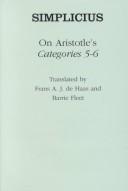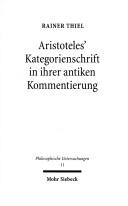| Listing 1 - 10 of 22 | << page >> |
Sort by
|

ISBN: 9780801438387 0801438381 Year: 2001 Publisher: Ithaca (N.Y.): Cornell university press,
Abstract | Keywords | Export | Availability | Bookmark
 Loading...
Loading...Choose an application
- Reference Manager
- EndNote
- RefWorks (Direct export to RefWorks)
Book
ISBN: 9781350191327 1350191329 1350191329 9781350191327 Year: 2021 Publisher: London: Bloomsbury academic,
Abstract | Keywords | Export | Availability | Bookmark
 Loading...
Loading...Choose an application
- Reference Manager
- EndNote
- RefWorks (Direct export to RefWorks)
"One of his six introductions to philosophy, widely used by students in Alexandria, Ammonius' lecture on Porphyry was recorded in writing by his students in the commentary translated here. Along with five other types of introductions (three of which are translated in the Ancient Commentators on Aristotle volume Elias and David: Introductions to Philosophy with Olympiodorus: Introduction to Logic) it made Greek philosophy more accessible to other cultures. These introductions became standard in Ammonius' school and included a popular set of five or more definitions of philosophy, some of them drawn from commentaries on quite different works."
Book
ISBN: 9789025612665 9025612660 Year: 2011 Volume: 61 Publisher: Amsterdam Hakkert
Abstract | Keywords | Export | Availability | Bookmark
 Loading...
Loading...Choose an application
- Reference Manager
- EndNote
- RefWorks (Direct export to RefWorks)
Categories (Philosophy) --- Catégories (Philosophie) --- Aristotle. --- Aristotle --- Catégories (Philosophie) --- Aristotle - Categoriae

ISSN: 14342650 ISBN: 3161482786 9783161482786 Year: 2004 Volume: 11 Publisher: Tübingen Mohr Siebeck
Abstract | Keywords | Export | Availability | Bookmark
 Loading...
Loading...Choose an application
- Reference Manager
- EndNote
- RefWorks (Direct export to RefWorks)
Categories (Philosophy) --- Aristotle. --- Predicaments (Categories) --- Knowledge, Theory of --- Logic --- Ontology --- Predicate (Logic) --- Aristotle. - Categoriae.
Book
ISBN: 3110036762 3110835452 9783110036763 Year: 2011 Volume: 4 Publisher: Berlin ; Boston : De Gruyter,
Abstract | Keywords | Export | Availability | Bookmark
 Loading...
Loading...Choose an application
- Reference Manager
- EndNote
- RefWorks (Direct export to RefWorks)
Keine ausführliche Beschreibung für "Pseudo-Archytas über die Kategorien" verfügbar.
Aristotle --- Aristotle. --- Griechenland. --- Kategorie / Geschichte. --- Kategorie. --- HISTORY / Ancient / General. --- Aristotle - Categoriae.
Book
ISBN: 0715630377 1780938934 9780715630372 9781780938936 Year: 2014 Publisher: London : Bloomsbury,
Abstract | Keywords | Export | Availability | Bookmark
 Loading...
Loading...Choose an application
- Reference Manager
- EndNote
- RefWorks (Direct export to RefWorks)
Aristotle. Categoriae. 5-6. --- Categories (Philosophy) -- Early works to 1800. --- Categories (Philosophy) --- Aristotle. --- Aristote, --- Aristote
Book
ISBN: 9781472557346 1472557344 1472557387 0715631977 9780715631973 9781472557384 9781472501073 1472501071 9780715630389 9781472558510 9780715629000 1472552164 0715630385 1472558510 071562900X Year: 2000 Publisher: London Duckworth
Abstract | Keywords | Export | Availability | Bookmark
 Loading...
Loading...Choose an application
- Reference Manager
- EndNote
- RefWorks (Direct export to RefWorks)
Simplicius' commentary on Aristotle's "Categories" falls into two parts. First, it examines the six categories dealt with in chapter 9 of "Categories", namely acting, undergoing, being in a position, when, where, and having. Secondly, it examines the so-called "Postpraedicamenta" consisting of chapter 10-15, which treat four kinds of opposition (relatives, contraries, possession, and privation, affirmation and negation), along with priority, simultaneity, movement and (again) having.
Aristote, --- Categories (Philosophy) --- Categories (Philosophy). --- Aristotle. --- Categoriae (Aristotle). --- Neuplatonismus. --- Physik. --- Categoriae (Aristotle) --- Aristotle --- Naturphilosophie. --- Aristoteles, --- Simplicius, --- Aristote --- Aristotle - Categoriae
Book
ISBN: 9781472584106 1472584104 9781474295703 1474295703 1472584112 1474220185 1472584120 9781472584120 9781472584113 Year: 2016 Publisher: London Bloomsbury Academic
Abstract | Keywords | Export | Availability | Bookmark
 Loading...
Loading...Choose an application
- Reference Manager
- EndNote
- RefWorks (Direct export to RefWorks)
Philoponus' On Aristotle Categories 1-5 discusses the nature of universals, preserving the views of Philoponus' teacher Ammonius, as well as presenting a Neoplatonist interpretation of Aristotle's Categories. Philoponus treats universals as concepts in the human mind produced by abstracting a form or nature from the material individual in which it has its being. The work is important for its own philosophical discussion and for the insight it sheds on its sources. For considerable portions, On Aristotle Categories 1-5 resembles the wording of an earlier commentary which declares itself to be an anonymous record taken from the seminars of Ammonius. Unlike much of Philoponus' later writing, this commentary does not disagree with either Aristotle or Ammonius, and suggests the possibility that Philoponus either had access to this earlier record or wrote it himself. This edition explores these questions of provenance, alongside the context, meaning and implications of Philoponus' work. The English translation is accompanied by an introduction, comprehensive commentary notes, bibliography, glossary of translated terms and a subject index. The latest volume in the Ancient Commentators on Aristotle series, the edition makes this philosophical work accessible to a modern readership. Philoponus was a Christian writing in Greek in 6th century CE Alexandria, where some students of philosophy were bilingual in Syriac as well as Greek. In this Greek treatise translated from the surviving Syriac version, Philoponus discusses the logic of parts and wholes, and he illustrates the spread of the pagan and Christian philosophy of 6th century CE Greeks to other cultures, in this case to Syria. Philoponus, an expert on Aristotle's philosophy, had turned to theology and was applying his knowledge of Aristotle to disputes over the human and divine nature of Christ. Were there two natures and were they parts of a whole, as the Emperor Justinian proposed, or was there only one nature, as Philoponus claimed with the rebel minority, both human and divine? If there were two natures, were they parts like the ingredients in a chemical mixture? Philoponus attacks the idea. Such ingredients are not parts, because they each inter-penetrate the whole mixture. Moreover, he abandons his ingenious earlier attempts to support Aristotle's view of mixture by identifying ways in which such ingredients might be thought of as potentially preserved in a chemical mixture. Instead, Philoponus says that the ingredients are destroyed, unlike the human and divine in Christ. This English translation of Philoponus' treatise is the latest volume in the Ancient Commentators on Aristotle series and makes this philosophical work accessible to a modern readership. The translation in each volume is accompanied by an introduction, comprehensive commentary notes, bibliography, glossary of translated terms and a subject index.
Neoplatonism. --- Aristotle. --- Categoriae (Aristotle). --- Néo-platonisme --- Neoplatonism --- Aristotle --- Aristotle - Categoriae --- Categories (Philosophy) --- Early works to 1800.
Book
ISSN: 1384668X ISBN: 9789027214683 9789027266477 9027266476 9027214689 Year: 2016 Volume: band 58 Publisher: Amsterdam Benjamins
Abstract | Keywords | Export | Availability | Bookmark
 Loading...
Loading...Choose an application
- Reference Manager
- EndNote
- RefWorks (Direct export to RefWorks)
Master Nicholas of Amsterdam was a prominent master of arts in Germany during the first half of the fifteenth century. He composed various commentaries on Aristotle's works. One of these commentaries is on the 'logica vetus', the old logic, viz. on Porphyry's 'Isagoge' and on Aristotle's 'Categories' and 'On Interpretation'. This commentary is edited and introduced here. Nicholas is a 'modernus' - as opposed to the 'antiqui', who were realists - which means that he is a conceptualist belonging to the university tradition that accepted John Buridan (ca. 1300-1360 or 1361) and Marsilius of Inghen (ca. 1340-1396) as its masters. In medieval philosophy, a parallel between thinking and reality is generally upheld. Nicholas makes a sharp distinction between the two; this may be interpreted as a step towards a separation between the two realms, as is common in philosophy in later centuries. Other characteristics of Nicholas are that he defends the position that science has its place in a proposition, and does not simply follow reality. Furthermore, he emphasizes the part played by individual things. Master Nicholas of Amsterdam was a prominent master of arts in Germany during the first half of the fifteenth century. He composed various commentaries on Aristotle's works. One of these commentaries is on the logica vetus, the old logic, viz. on Porphyry's Isagoge and on Aristotle's Categories and On Interpretation. This commentary is edited and introduced here. Nicholas is a 'modernus' - as opposed to the 'antiqui', who were realists - which means that he is a conceptualist belonging to the university tradition that accepted John Buridan (ca. 1300-1360 or 1361) and Marsilius of Inghen (ca. 1340-1396) as its masters. In medieval philosophy, a parallel between thinking and reality is generally upheld. Nicholas makes a sharp distinction between the two; this may be interpreted as a step towards a separation between the two realms, as is common in philosophy in later centuries. Other characteristics of Nicholas are that he defends the position that science has its place in a proposition, and does not simply follow reality. Furthermore, he emphasizes the part played by individual things. Fifteenth-century philosophy has hardly been studied, mainly because that century has long been considered unoriginal. Nicholas of Amsterdam certainly deserves the historian's interest in order to evaluate how medieval philosophy prepared the way for modern philosophy.
Logic, Medieval --- Logic, Ancient --- Aristotle. --- Porphyry, --- Logique médiévale --- Logique antique --- Aristote, --- Porphyre, --- Aristote --- Porphyre --- Logique médiévale. --- Logique antique. --- Aristotle. - Categoriae --- Aristotle. - De interpretatione --- Porphyry, - approximately 234-approxiamtely 305. - Isagoge --- Logique médiévale.
Book
ISSN: 04912764 ISBN: 9122018972 9789122018971 Year: 2000 Volume: 45 Publisher: Stockholm : Almqvist och Wiksell,
Abstract | Keywords | Export | Availability | Bookmark
 Loading...
Loading...Choose an application
- Reference Manager
- EndNote
- RefWorks (Direct export to RefWorks)
Categories (Philosophy) --- Manuscripts, Latin (Medieval and modern) --- Aristotle --- Medieval and modern Latin manuscripts --- Manuscripts, Medieval --- Predicaments (Categories) --- Knowledge, Theory of --- Logic --- Ontology --- Predicate (Logic) --- Aristotle. --- Categories (Philosophy) - Early works to 1800 --- Aristotle - Categoriae
| Listing 1 - 10 of 22 | << page >> |
Sort by
|

 Search
Search Feedback
Feedback About UniCat
About UniCat  Help
Help News
News